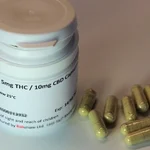Understanding Medical Marijuana
Medical marijuana is a term used to describe the use of the marijuana plant, or its extracts, to treat medical conditions. It is different from recreational cannabis use and is legal in several states in the United States, including Florida. Medical marijuana is believed to have several therapeutic benefits, including pain relief, muscle relaxation, and anti-inflammatory effects.
The Active Compounds in Marijuana
There are over 500 compounds in the cannabis plant, including over 100 cannabinoids. The most well-known cannabinoid is delta-9-tetrahydrocannabinol (THC), which is responsible for the psychoactive effects of marijuana. Another cannabinoid that has gained attention in recent years is cannabidiol (CBD), which is believed to have several therapeutic benefits without causing the “high” associated with THC.
The Endocannabinoid System
The endocannabinoid system (ECS) is a complex system of neurotransmitters and receptors that regulate various physiological processes, including pain, inflammation, mood, and appetite. The human body naturally produces endocannabinoids, which are similar in structure to the cannabinoids found in the cannabis plant. The ECS is believed to play a role in the therapeutic effects of medical marijuana.
The History of Medical Marijuana in Florida
Florida first legalized medical marijuana in 2014 with the passage of the Compassionate Medical Cannabis Act. However, the law was limited in scope and only allowed for low-THC cannabis for patients with qualifying medical conditions. In 2016, Florida voters approved Amendment 2, which expanded the state’s medical marijuana program to include a wider range of medical conditions and forms of cannabis.
Qualifying Medical Conditions
To qualify for medical marijuana in Florida, patients must have one of the following qualifying medical conditions:
- Cancer
- Epilepsy
- Glaucoma
- HIV/AIDS
- Crohn’s disease
- Parkinson’s disease
- Multiple sclerosis
- Chronic nonmalignant pain caused by a qualifying medical condition
The Application Process
To obtain medical marijuana in Florida, patients must first obtain a recommendation from a qualified physician. The physician must be registered with the Florida Department of Health’s Office of Medical Marijuana Use. Once the patient has received a recommendation, they can apply for a medical marijuana card through the state’s online system. Patients must pay a fee and provide proof of residency and a copy of their recommendation.
Forms of Medical Marijuana
In Florida, medical marijuana is available in several forms, including:
- Smokable flower
- Concentrates
- Edibles
- Tinctures
- Topicals
Different forms of medical marijuana may be more appropriate for different medical conditions or personal preferences.
Legal Restrictions
Although medical marijuana is legal in Florida, there are several legal restrictions that patients must abide by. For example, patients are not allowed to grow their own marijuana plants, and it is illegal to smoke medical marijuana in public places. Employers are also not required to accommodate medical marijuana use in the workplace.
Conclusion
Medical marijuana can be a useful tool for managing certain medical conditions, but it is important to understand the laws and regulations surrounding its use. In Florida, patients must have a qualifying medical condition and obtain a recommendation from a qualified physician to obtain medical marijuana legally. Patients should also be aware of legal restrictions and the different forms of medical marijuana available to determine what is best for their individual needs.












